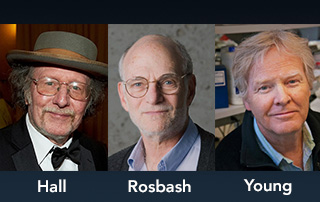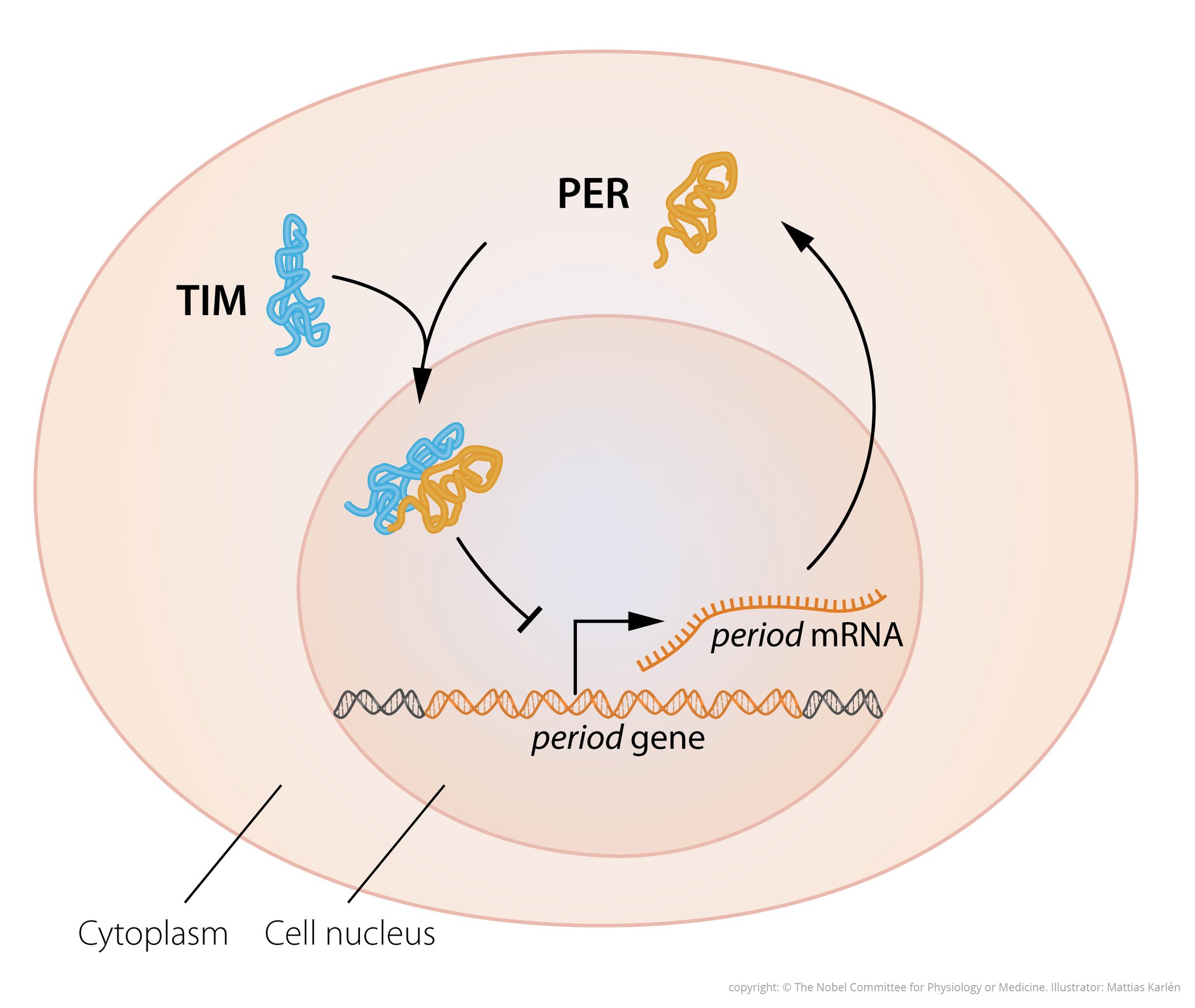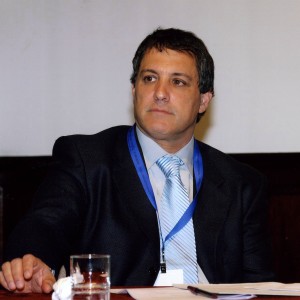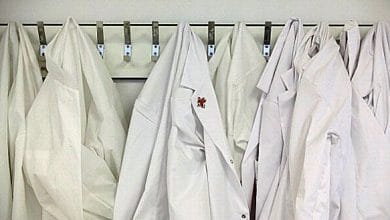
The Nobel Prize for Medicine or Physiology this year awarded the research of Jeffrey C. Hall, Michael Rosbash and Michael W. Young on circadian rhythms
The Sciences – 02 October 2017
The Nobel Assembly at Karolinska Institut has awarded this year's Nobel Prize in Medicine or Physiology to Jeffrey C. Hall, Michael Rosbash and Michael W. Young. The three researchers, all from the United States, were awarded for "their discoveries on the molecular mechanisms that control the circadian rhythm".
 Jeffrey C. Hall was born in 1945 in New York. He received his doctorate in 1971 at the University of Washington in Seattle, and then specialized at the California Institute of Technology in Pasadena. He then worked at Brandeis University in Waltham and later at the University of Maine.
Jeffrey C. Hall was born in 1945 in New York. He received his doctorate in 1971 at the University of Washington in Seattle, and then specialized at the California Institute of Technology in Pasadena. He then worked at Brandeis University in Waltham and later at the University of Maine.
Michael Rosbash was born in 1944 in Kansas City. He received his doctorate degree in 1970 from the Massachusetts Institute of Technology. He later worked at the University of Edinburgh in Scotland and then at Brandeis University in Waltham, USA.
Michael W. Young was born in 1949 in Miami. He received his doctorate from the University of Texas at Austin in 1975. He then worked at Stanford University in Palo Alto. He has been at Rockefeller University in New York since 1978.
The biological clock is involved in many aspects of the physiology of all multicellular organisms, from the sleep-wake rhythm to the release times of numerous hormones.
In the 1970s Seymour Benzer and Ronald Konopka demonstrated that mutations in an unknown gene were capable of disrupting the regular circadian rhythm in the fruit fly burps, thus showing that circadian rhythms have a genetic basis.
burps, thus showing that circadian rhythms have a genetic basis.
In 1984, Jeffrey Hall and Michael Rosbash, working closely together at Brandeis University in Boston, and Michael Young of Rockefeller University in New York, succeeded in isolating the gene involved. Jeffrey Hall and Michael Rosbash then discovered that PER, the protein encoded by that gene, accumulates during the night and is degraded during the day. Thus, PER protein levels fluctuate on a 24-hour cycle, in synchrony with the circadian rhythm.
The next goal was to understand how these circadian oscillations are generated and sustained.
Jeffrey Hall and Michael Rosbash hypothesized and then demonstrated that the PER protein blocks gene activity through an inhibitory feedback loop; in this way the PER protein could prevent its own synthesis and therefore regulate its level in a continuous cyclical cycle.
However, some pieces of the puzzle were missing. To block the gene's activity, the PER protein – produced in the cytoplasm – has to reach the cell nucleus, where the DNA is located, and the mechanism was not at all clear.
In 1994 Michael Young discovered a second gene involved in the biological clock, the gene encoding the protein TIM, which is also required for a normal circadian rhythm. Young has in particular demonstrated that when TIM binds to PER, the two proteins are able to enter the cell nucleus by blocking the activity of the gene that controls the circadian rhythm, through the inhibitory feedback loop.
 This feedback mechanism explained how the oscillation of cellular levels of the proteins involved emerges, but what regulates the frequency of the oscillations still remained to be understood.
This feedback mechanism explained how the oscillation of cellular levels of the proteins involved emerges, but what regulates the frequency of the oscillations still remained to be understood.
Seymour Benzer and Michael Young have therefore identified another gene, which through the DBT protein delays the accumulation of the PER protein. The finding provided insight into how a swing is regulated to more closely match a 24-hour cycle.
In this way Hall, Rosbash and Young have defined the fundamental principles of the functioning of the biological clock, allowing the discovery, in the following years, of other molecular components that allow the stability of the mechanism, its synchronization with the day/night cycle, and the differentiation of the rhythms with which the biological clock contributes to the release of the different hormones.
Related news: Scientific Background Discoveries of Molecular Mechanisms Controlling the Circadian Rhythm
What does the Nobel Prize for medicine have to do with WhatsApp notifications
The 2017 Nobel Prize in Medicine was awarded to Jeffrey C. Hall, Michael Rosbash and Michael W. Young. They are the three researchers who have discovered a very particular biological mechanism: the circadian cycle. It is the mechanism that regulates the basic functions of our body such as, for example, the cycle of sleep and wakefulness. Using fruit flies as a model organism, the new Nobel laureates have isolated a gene that controls the normal daily biological rhythm. Demonstrating that this gene encodes a protein that accumulates in cells during the night, and is then degraded during the day.
the sleep-wake cycle encodes a protein that builds up in cells during the night
It is an announcement that displaces compared to the rumors that had circulated on the eve. Moreover, with few exceptions, such as that of the Nobel Prize for Physics to Peter Higgs in 2013, which took place immediately after the discovery of the Higgs Boson at Cern in Geneva, the Royal Academy of Science in Stockholm hardly lets itself be anticipated in its choices.
 Welcoming the news of this award with great enthusiasm, Liborio Perrino, director of the Sleep Health Center of the University of Parma Hospital. “Finally – he told Agi – a truly great recognition that brings all our work out of the shadows. The circadian rhythm - adds Parrino - is the pillar around which our body revolves. Chronobiology (the biological mechanisms linked to the passage of time ed) is like the bed of the river which allows the water to reach the valley. These are fundamental mechanisms which we must absolutely take into account”.
Welcoming the news of this award with great enthusiasm, Liborio Perrino, director of the Sleep Health Center of the University of Parma Hospital. “Finally – he told Agi – a truly great recognition that brings all our work out of the shadows. The circadian rhythm - adds Parrino - is the pillar around which our body revolves. Chronobiology (the biological mechanisms linked to the passage of time ed) is like the bed of the river which allows the water to reach the valley. These are fundamental mechanisms which we must absolutely take into account”.
The circadian rhythm - adds Parrino - is the pillar around which our body revolves
The alteration of these rhythms has in fact direct repercussions for health. “We know – adds Parrino – that the wake-sleep cycle plays a very important role with regard to a series of balances that underlie health. For example, lack of sleep leads much more frequently to developing hypertension and with it the related risks of heart attack and stroke. We also know that lack of sleep has a major impact on women's health and their hormonal cycles. For example, those who work night shifts have a higher risk of breast cancer, just as we know that the metabolism in general is also affected by lack of sleep".
For Parrino, the Nobel prize awarded to the discoverers of the circadian rhythm is also an opportunity to reflect, as a society, on the way we organize our lives. “We are very much urged – he explains – to continue to be awake when we should be sleeping. Televisions, chats, smartphones, increasingly flexible working hours, have the impact of weakening our ability to have regular sleep. We must learn to defend ourselves from these attacks and to give sleep the dimension of care it deserves”.
Source: AGI Healthcare News - Federfarma 02/10/201712:57
The Nobel Prize for Chemistry 2017 to cryo-electron microscopy





